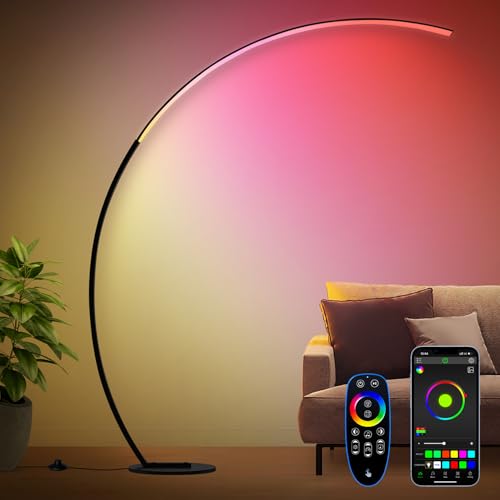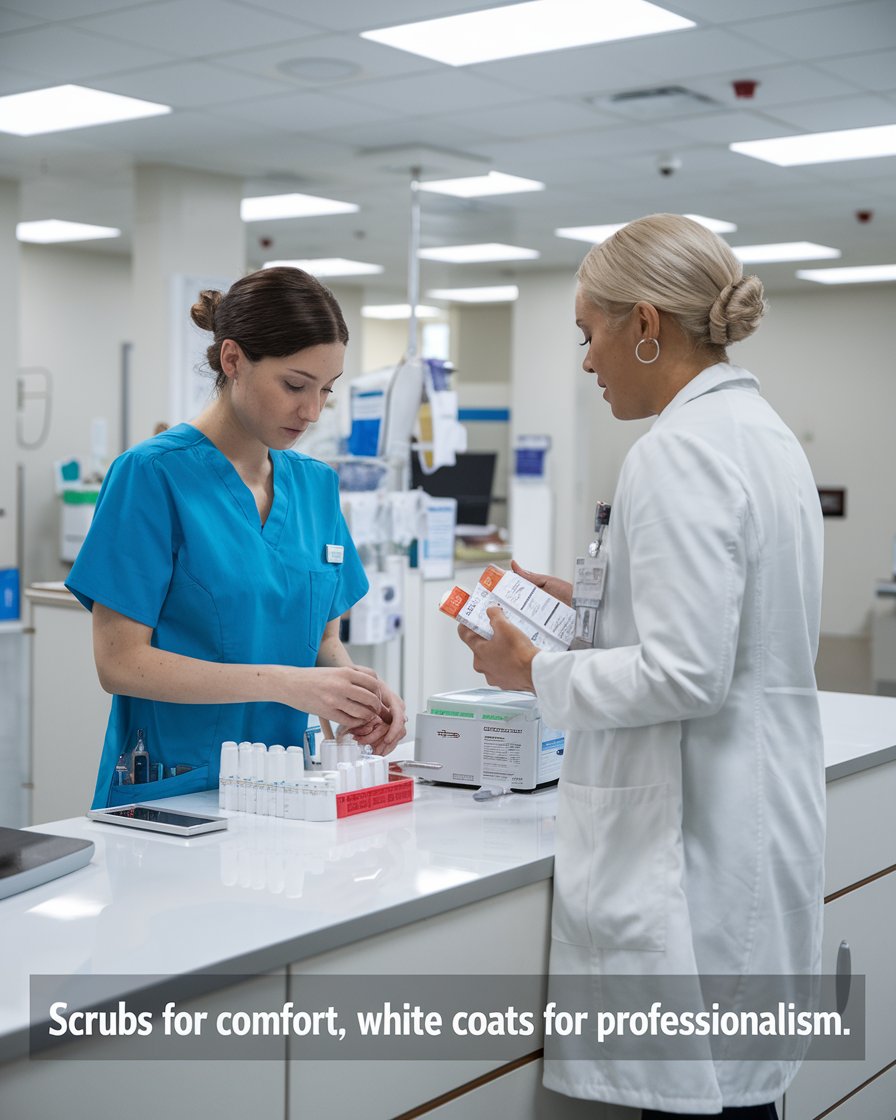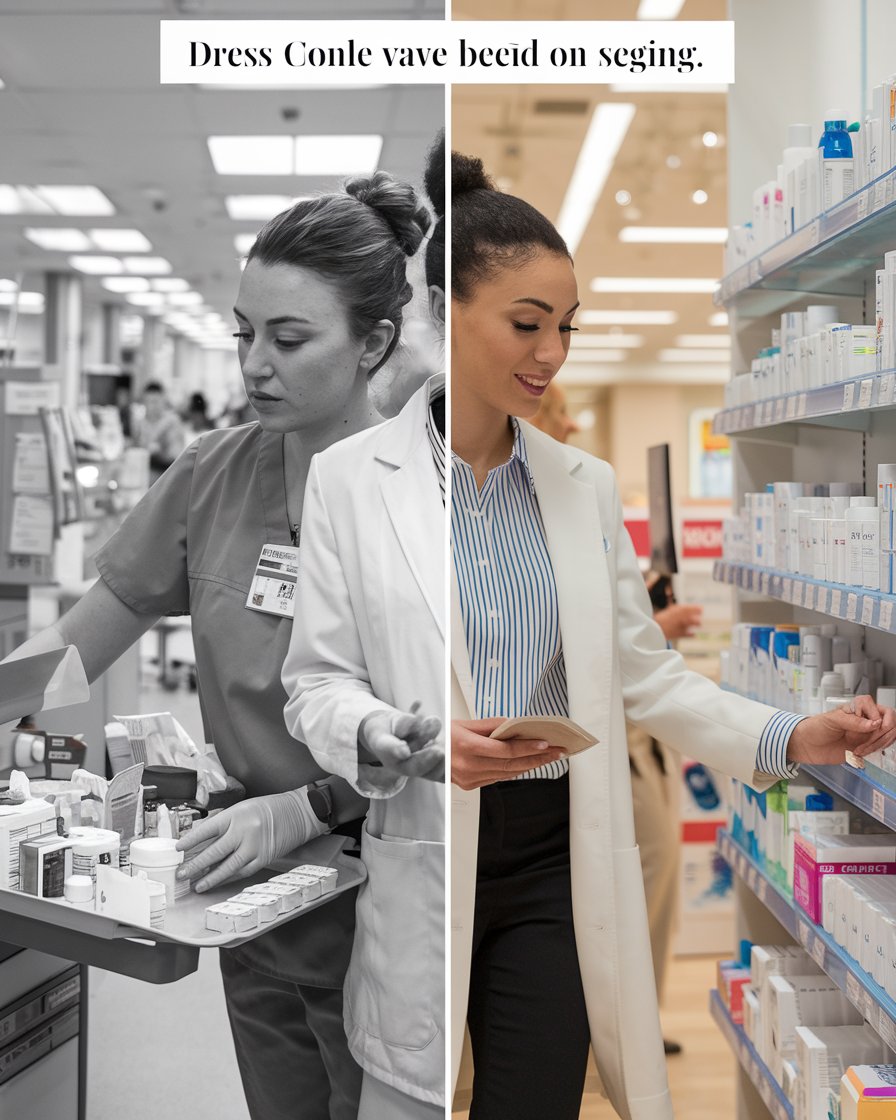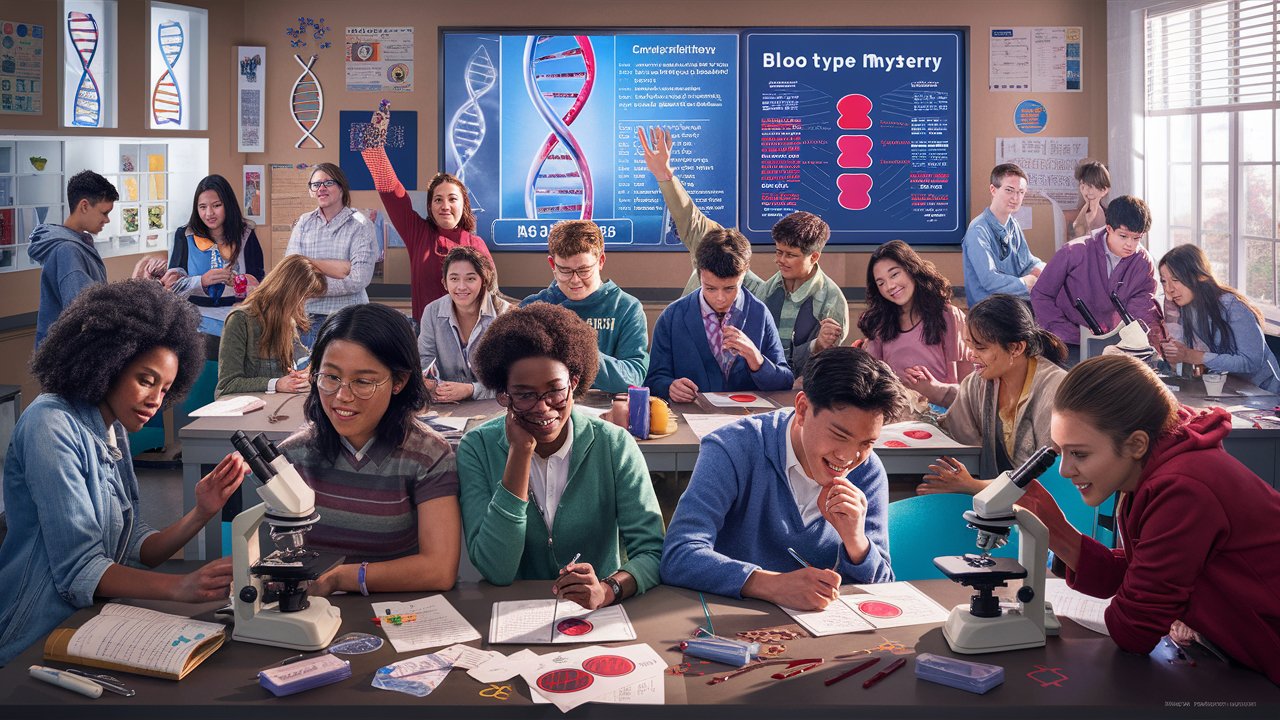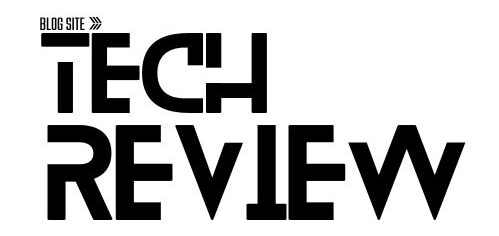Introduction
Pharmacy technicians play a crucial role in the healthcare industry, often working long hours on their feet. What they wear can greatly impact both their comfort and professionalism. Typically, pharmacy techs wear scrubs or a white lab coat, depending on the workplace’s dress code. In hospital settings, scrubs are favored for their practicality, while retail pharmacies, such as CVS, may require business casual attire, sometimes paired with a white coat. The dress code can vary, but maintaining a professional appearance is always essential for interacting with customers and colleagues.
In retail environments like CVS or Walgreens, pharmacy technicians might wear a white coat over their professional attire, such as a dress shirt and dress pants. The choice of uniform depends on the company’s specific policies. However, scrubs remain a popular option for pharmacy technicians in hospitals due to their comfort and flexibility, especially during long shifts. Regardless of the environment, technicians must ensure they follow the required dress code to maintain a professional appearance.
Key Takeaways
- Pharmacy technicians typically wear scrubs or a white coat, depending on the workplace, balancing comfort and professionalism.
- Scrubs are the most common attire in hospitals because they offer practicality, flexibility, and ease of movement during long shifts.
- In retail settings like CVS, pharmacy techs often wear business casual clothing paired with a white lab coat to maintain a polished appearance.
- The dress code can vary based on location, with some pharmacy techs allowed to wear more casual attire, such as jeans or dress pants.
- Comfort and functionality are crucial, so pharmacy techs should choose attire, like comfortable shoes, that allows for ease during long hours.
- Pharmacy techs must follow specific dress code policies set by their employer to maintain a professional look while ensuring comfort throughout the day.
What Pharmacy Technicians Wear: Scrubs and White Coats
Pharmacy technicians typically wear a pair of scrubs or a white lab coat, depending on their workplace’s dress code. Scrubs are favored for comfort and practicality, especially in hospital settings, where pharmacy techs may assist in various tasks. In retail environments like CVS or Walgreens, a more casual dress code may allow for professional attire, such as dress pants and a dress shirt, or a white coat over scrubs. The specific type of uniform often varies by the company’s policy, but wearing comfortable shoes is essential for long shifts. Pharmacy techs must choose attire that reflects both function and appearance, as part of a team of healthcare professionals, ensuring their outfit looks like it aligns with the standards pharmacists wear. Students entering the workforce often follow the same guidelines, aiming to fit in with the professional look expected from all healthcare workers.
Key Uniform Considerations for Pharmacy Technicians
Scrubs: A Standard Uniform in Hospitals
Pharmacy technicians working in hospitals often wear scrubs due to their practicality, comfort, and ease of movement during long shifts. Scrubs also provide a professional yet functional appearance that fits the sterile environment in healthcare settings.White Coats for a Professional Look in Retail Pharmacies
In retail pharmacies, such as CVS and Walgreens, technicians may be required to wear white lab coats over their business casual attire. This dress code maintains a polished, professional image, particularly when interacting with customers.Comfortable Footwear is Essential for Long Shifts
Regardless of the dress code, comfortable shoes are a must for pharmacy techs, who spend hours on their feet. Both hospital and retail environments emphasize the need for footwear that supports long hours of standing and walking.Dress Code Variations Based on Company Policies
While scrubs are the norm in hospital settings, retail pharmacies might allow more flexibility, such as wearing a white coat over casual or business casual attire. Company policies dictate these dress codes, ensuring techs maintain both comfort and professionalism.Balancing Professionalism and Practicality
Pharmacy technicians must balance looking professional with practicality. Scrubs are ideal for hands-on tasks, while white coats present a more formal image in customer-facing roles, reflecting the technician’s role within the pharmacy environment.
Why Scrubs Are a Popular Choice for Pharmacy Technicians
Scrubs are a favorite among pharmacy technicians, especially in hospitals, because they’re practical and comfortable for long hours. They are easy to clean and provide the flexibility needed for tasks like compounding medications or working in sterile environments. Scrubs also help maintain a professional appearance that’s consistent with healthcare roles. While many pharmacy techs prefer scrubs for their comfort, some retail pharmacies might require more formal attire. However, scrubs remain a common choice in medical settings due to their durability and ease of movement.
The Role of White Coats in the Pharmacy Technician Uniform
A white lab coat is often associated with a clean, professional look, which is why some pharmacy technicians wear it over their regular clothes. White coats can be seen in both hospital and retail pharmacies. They signify professionalism and can be paired with either scrubs or business casual attire, depending on the dress code. Techs working at CVS or Walgreens might be required to wear a white coat as part of the company’s policy, giving them a polished, professional appearance that’s suitable for interactions with customers.
Understanding the Pharmacy Dress Code: Are Scrubs Allowed?
The dress code for pharmacy technicians can vary greatly depending on where they work. In many places, wear professional attire like scrubs is the standard due to their ease of wear and practicality, especially for those involved in compounding medications. At other pharmacies, such as CVS, techs might be required to wear a white coat over business casual attire, including a tie. The rule around this choice depends on the company’s guidelines, though some techs may also be allowed to wear jeans during certain shifts, which is less common. Pharmacy techs should keep in mind the importance of adhering to their employer’s specific dress code to ensure they maintain a professional appearance that’s appropriate for their setting.
Case Study: Implementing Dress Code for Pharmacy Technicians at CVS vs. Hospital Settings
In a hospital setting, pharmacy technicians primarily wear scrubs for their comfort, practicality, and hygiene requirements. Scrubs are easy to clean, breathable, and allow free movement, which is essential for techs who may need to perform hands-on tasks like compounding medications. Hospital management typically enforces scrubs to maintain a sterile and professional environment.
At retail pharmacies like CVS, the dress code can vary. Technicians may initially wear business casual attire until they receive their assigned blue scrubs. A white lab coat might also be required for those working directly with customers, serving as both a uniform and a means to establish a professional connection with customers. This differentiation helps customers feel confident in the technician’s role and abilities, particularly when discussing sensitive health concerns.
Both environments emphasize the importance of comfortable shoes for long shifts and clear identification through uniforms that signify a professional role.
Pharmacy Dress Codes in Hospitals vs. Retail Settings
Pharmacy dress codes can vary depending on whether techs work in hospitals or retail environments. In hospitals, scrubs are usually the norm due to the hands-on nature of the work. In contrast, retail settings like CVS or Walgreens often require pharmacy techs to wear business casual attire, sometimes with a white lab coat. This distinction is important because it reflects the different roles techs play in these environments. Whether in scrubs or dress pants, techs should adhere to their workplace’s policy to maintain a professional appearance.
The Importance of Comfort and Functionality in Pharmacy Uniforms
Whether techs wear scrubs, business casual, or a white coat, comfort and functionality are key. Pharmacy technicians spend long hours on their feet, so wearing comfortable shoes and clothing that allows free movement is essential. Scrubs offer flexibility and ease of wear, especially when working in busy environments like hospitals. Retail settings might have stricter dress codes, but the focus on comfort remains. Techs should choose attire that balances professionalism with the ability to move comfortably during their shifts.
Do CVS Pharmacy Techs Wear Scrubs or White Coats?
At CVS and other similar retail pharmacy chains, pharmacy technicians may wear a white coat over their professional attire, such as a dress shirt or dress pants. However, the dress code can differ slightly based on location or management preferences. While scrubs are generally worn in hospitals or compounding pharmacies, CVS employees might also have the option to wear comfortable clothing such as business casual attire. The policy at CVS focuses on maintaining a clean, professional look, so scrubs are less frequently worn, though not entirely excluded. Pharmacy technicians should always check what is allowed before starting their shift.
How CVS Dress Codes Influence Pharmacy Technician Uniform Choices
At CVS, the dress code usually leans towards a professional look, often requiring pharmacy technicians to wear a white coat over business casual attire. While scrubs are common in hospital pharmacies, CVS techs are generally expected to maintain a polished appearance, which may include a dress shirt, dress pants, or a white coat. However, depending on the specific location, the dress code might vary slightly. It’s important for pharmacy techs to clarify what’s allowed at their store to ensure they follow the guidelines properly.
Scrubs vs. Business Casual: Which Is Better for Retail Pharmacies?
While scrubs are practical in hospital settings, business casual is often preferred in retail pharmacies like CVS. Pharmacy techs in retail environments frequently interact with customers, so maintaining a professional appearance is important. A white coat over business casual attire helps techs look polished while still being comfortable enough to work efficiently. However, some techs may prefer scrubs for their comfort and ease. Ultimately, the decision to wear scrubs or business casual depends on company policy and personal preference.
“For pharmacists, what they wear is all about striking the right balance between looking professional and approachable.”
– Yvonne Tuckley, Learning and Development Manager at Numark
How Pharmacy Dress Varies: From Scrubs to Business Casual
Pharmacy technicians’ dress codes can range from scrubs in hospital settings to business casual attire in retail pharmacies. Scrubs are typically worn by those working in environments that require sterile conditions, while retail pharmacists might wear a white lab coat over business casual clothing, including dress pants and a dress shirt. Places like CVS might allow pharmacy techs to wear more relaxed attire, but the overall look is expected to remain professional. Pharmacy technicians wear scrubs, white coats, or other uniforms that help maintain a professional appearance while also allowing for comfort and functionality during long shifts.
Balancing Professionalism and Comfort in Pharmacy Attire
Pharmacy technicians need to balance looking professional with being comfortable during long shifts. Scrubs offer a practical solution in hospitals, providing ease of movement and comfort. In contrast, business casual attire paired with a white coat is often required in retail pharmacies, such as CVS or Walgreens. Both options aim to present a professional image while ensuring that techs can perform their duties efficiently. Pharmacy technicians should consider both comfort and appearance when choosing their attire, keeping company policies in mind.
How Scrubs and White Coats Differ in Appearance and Function
While scrubs are lightweight and easy to wear, white coats offer a more formal appearance. Scrubs are commonly worn in hospital settings, where functionality is key. In contrast, a white coat gives a more polished look and is often paired with business casual clothing in retail pharmacies. Both scrubs and white coats serve to maintain professionalism in their respective environments, but each has a different role depending on where the pharmacy tech works. Pharmacy techs should wear the uniform that best suits their work environment while staying comfortable throughout the day.
Conclusion
Pharmacy technicians must balance comfort and professionalism in their attire, whether they wear scrubs, business casual, or a white coat. In hospital settings, scrubs are favored for their flexibility and ease of movement, allowing techs to work long shifts comfortably. Retail environments like CVS and Walgreens may require more formal attire, such as business casual, paired with a white lab coat to maintain a polished and professional appearance when interacting with customers.
While scrubs are a practical option, pharmacy techs should always follow their company’s specific dress code to ensure they present themselves appropriately. Whether hired at CVS or working in a hospital, techs must choose attire that fits the demands of their work environment. Professional attire, such as dress pants and comfortable shoes, is also important for long hours on their feet. Maintaining a balance between professionalism and comfort ensures pharmacy technicians can perform their duties effectively while upholding a professional image.


